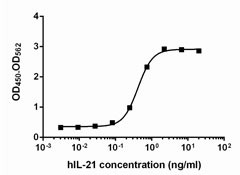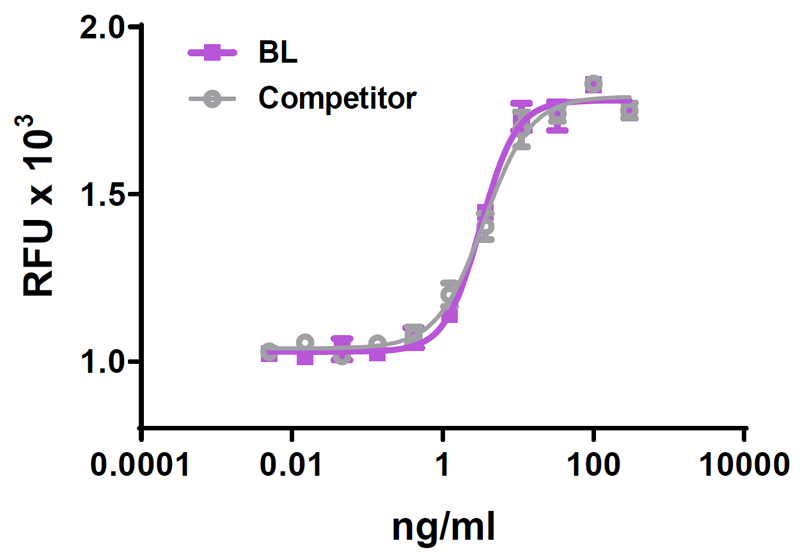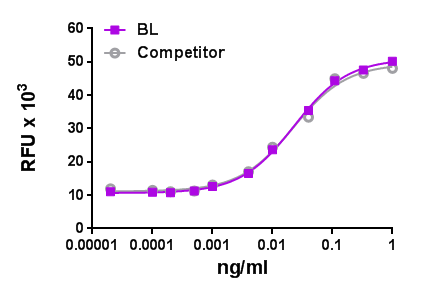- Regulatory Status
- RUO
- Other Names
- Interleukin 21
- Ave. Rating
- Submit a Review
- Product Citations
- publications

-

Human IL-21 induced-production of IFNγ by NK-92 cells. -

Recombinant human IL-21 induces the proliferation of mouse HT-2 cells in a dose-dependent manner. The ED50 for this effect is 0.05 - 0.5 µg/mL -

Stability Testing for Recombinant Human IL-21. Recombinant human IL-21 was aliquoted in PBS and 1 mM EDTA at 0.2 mg/mL and one aliquot was kept at 4°C (control), and another was frozen and thawed four times (4x Freeze/Thaw). The samples were tested by their property to induce the proliferation of mouse HT-2 cells in a dose-dependent manner. The ED50 for this effect is 0.05 - 0.5 µg/mL.
IL-21 was identified by a functional screening from conditioned medium of activated T cells using Baf3-IL-21R transfectants. In normal B cells, IL-21 can mediate cell proliferation, growth arrest, and terminal differentiation, or apoptosis, depending on their activation status. IL-21 enhances B cell proliferation following incubation with an activating CD40 antibody. This result suggests that IL-21 enhances B cell function following T:B cell interactions. Nevertheless, IL-21 inhibits the proliferation of murine and human B cells stimulated with anti-IgM antibodies. In addition, IL-21 enhances proliferation, cytotoxic activity, and IFNγ production by CD8-effector T cells, and induces terminal differentiation of activated natural killer (NK) cells. Also, IL-21 can drive Th17 responses in conjunction with TGF-β. Nevertheless, IL-21 is not essential for the differentiation of Th17 cells in vitro or in vivo, as it was showed using IL-21 and IL-21R-deficient mice. IL-6 induces the production of IL-21 from CD4 T cells upon TCR stimulation. In addition, IL-6 and IL-21 are key players in the Tfh differentiation, characterized by increased protein expression of both Bcl-6 and CXCR5. IL-21R complex is formed with the IL-21R-alpha chain and the common subunits (γc) shared with other interleukins, such as IL-2, IL-4, IL-7, IL-9, and IL-15.
Product DetailsProduct Details
- Source
- Human IL-21, amino acids Gln30-Ser162 (Accession# NM_021803) was expressed in E. coli.
- Molecular Mass
- The 133 amino acid recombinant protein has a predicted molecular mass of approximately 15.5 kD. The DTT-reduced and non-reduced protein migrate at approximately 16 kD by SDS-PAGE. The N-terminal amino acid is Glutamine.
- Purity
- > 95%, as determined by Coomassie stained SDS-PAGE.
- Formulation
- 0.22 µm filtered protein solution is in PBS and 1 mM EDTA.
- Endotoxin Level
- Less than 0.01 ng per µg cytokine as determined by the LAL method.
- Concentration
- 10 and 25 µg sizes are bottled at 200 µg/mL. 100 µg size and larger sizes are lot-specific and bottled at the concentration indicated on the vial. To obtain lot-specific concentration and expiration, please enter the lot number in our Certificate of Analysis online tool.
- Storage & Handling
- Unopened vial can be stored between 2°C and 8°C for up to 2 weeks, at -20°C for up to six months, or at -70°C or colder until the expiration date. For maximum results, quick spin vial prior to opening. The protein can be aliquoted and stored at -20°C or colder. Stock solutions can also be prepared at 50 - 100 µg/mL in appropriate sterile buffer, carrier protein such as 0.2 - 1% BSA or HSA can be added when preparing the stock solution. Aliquots can be stored between 2°C and 8°C for up to one week and stored at -20°C or colder for up to 3 months. Avoid repeated freeze/thaw cycles.
- Activity
-
Assay 1. Recombinant human IL-21 induce IFNγ secretion on NK-92 cells in a dose-dependent manner. The ED50 for this effect is 0.6 – 3.0 ng/mL.
Assay 2. Recombinant human IL-21 induces the proliferation of mouse HT-2 cells in a dose-dependent manner. The ED50 for this effect is 0.05 - 0.5 µg/mL - Application
-
Bioassay
- Application Notes
-
BioLegend carrier-free recombinant proteins provided in liquid format are shipped on blue-ice. Our comparison testing data indicates that when handled and stored as recommended, the liquid format has equal or better stability and shelf-life compared to commercially available lyophilized proteins after reconstitution. Our liquid proteins are verified in-house to maintain activity after shipping on blue ice and are backed by our 100% satisfaction guarantee. If you have any concerns, contact us at tech@biolegend.com.
- Product Citations
-
Antigen Details
- Structure
- Interleukin
- Distribution
-
CD4 activated T cells, Th17 cells, NK T cells
- Function
- IL-21 induces T and B cell proliferation, B cell Ig class switching to IgG production, decreases dendritic cell function, enhances differentiation of effector and central memory T cells, and regulates T cell and hematopoietic progenitor cell homeostasis.
- Interaction
- T cells, B cells, NK cells, and dendritic cells as well as some nonimmune cells, such as fibroblasts and epithelial cells.
- Ligand/Receptor
- IL-21R and the common γc subunit (CD132) are components of the IL-21R complex.
- Cell Type
- B cells, Dendritic cells, Hematopoietic stem and progenitors, Tregs
- Biology Area
- Cell Biology, Immunology, Innate Immunity, Stem Cells
- Molecular Family
- Cytokines/Chemokines
- Antigen References
-
1. Parrish-Novak J, et al. 2000. Nature 408:57.
2. De Totero D, et al. 2006. Blood 107:3708.
3. Korn T, et al. 2007. Nature 448:484.
4. Coquet JM, et al. 2008. J. Immunol. 180:7097.
5. Dienz O, et al. 2009. J. Exp. Med. 206:69.
6. Kaplan MH, et al. 2011. Blood 117:6198.
7. Eto D, et al. 2011. PLoS One 6:e17739. - Gene ID
- 59067 View all products for this Gene ID
- UniProt
- View information about IL-21 on UniProt.org
Related FAQs
- Why choose BioLegend recombinant proteins?
-
• Each lot of product is quality-tested for bioactivity as indicated on the data sheet.
• Greater than 95% Purity or higher, tested on every lot of product.
• 100% Satisfaction Guarantee for quality performance, stability, and consistency.
• Ready-to-use liquid format saves time and reduces challenges associated with reconstitution.
• Bulk and customization available. Contact us.
• Learn more about our Recombinant Proteins. - How does the activity of your recombinant proteins compare to competitors?
-
We quality control each and every lot of recombinant protein. Not only do we check its bioactivity, but we also compare it against other commercially available recombinant proteins. We make sure each recombinant protein’s activity is at least as good as or better than the competition’s. In order to provide you with the best possible product, we ensure that our testing process is rigorous and thorough. If you’re curious and eager to make the switch to BioLegend recombinants, contact your sales representative today!
- What is the specific activity or ED50 of my recombinant protein?
-
The specific activity range of the protein is indicated on the product datasheets. Because the exact activity values on a per unit basis can largely fluctuate depending on a number of factors, including the nature of the assay, cell density, age of cells/passage number, culture media used, and end user technique, the specific activity is best defined as a range and we guarantee the specific activity of all our lots will be within the range indicated on the datasheet. Please note this only applies to recombinants labeled for use in bioassays. ELISA standard recombinant proteins are not recommended for bioassay usage as they are not tested for these applications.
- Have your recombinants been tested for stability?
-
Our testing shows that the recombinant proteins are able to withstand room temperature for a week without losing activity. In addition the recombinant proteins were also found to withstand four cycles of freeze and thaw without losing activity.
- Does specific activity of a recombinant protein vary between lots?
-
Specific activity will vary for each lot and for the type of experiment that is done to validate it, but all passed lots will have activity within the established ED50 range for the product and we guarantee that our products will have lot-to-lot consistency. Please conduct an experiment-specific validation to find the optimal ED50 for your system.
- How do you convert activity as an ED50 in ng/ml to a specific activity in Units/mg?
-
Use formula Specific activity (Units/mg) = 10^6/ ED50 (ng/mL)
 Login/Register
Login/Register 














Follow Us